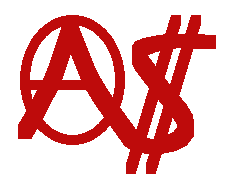The main flaw I see in your essay, Shayne, is that you misunderstand the definition of “anarchism” due to not knowing what anarchists mean by “government.” There are several definitions of “government,” but the ones relevant here are:
1. Jeffersonian/Nockian government - organized self-defense (defense of rights)
2. Weberian government - an organization with an effective monopoly on the use of legal violence in a particular geographic area
Your definition is basically the Nockian one, but anarchists use the Weberian one. (That’s Max Weber.) That’s why anarchists often use the term “compulsory government” - to make it clear that they do not oppose consensual (Nockian) government. And that is why we use “the State” - to distinguish what we oppose from consensual Nockian government.
So your “true anarchism” is a straw man. Anarchists would not “prohibit” consensual governments as you claim. I don’t know how you got this idea, because no anarchist I’ve ever heard of has proposed such a thing. The “foreign policy” of an anarchist society is panarchism - which is simply a term that means people should not be forcibly prevented from forming any type of consentual government. Incidentally, if you want to use the Nockian definition, then anarchism could be defined as “a system of (or philosophy of) voluntary competing governments.”
Your misunderstanding in defining “government” leads you to the erroneous conclusion that, because anarchists oppose government, they must logically “prohibit” governments by force. But that does not follow. Note the difference between a crime (violation of rights) and a vice. You may oppose using crack, but you would not prohibit it (if you respect rights.) Similarly, you may oppose coercive government, but you wouldn’t prohibit people from voluntarily indenturing themselves to a State.
You seem to imply that the Weberian definition of government is “begging the question.” But that fallacy refers to an argument, not a definition. And it takes some reasoning, a theory of rights, and the premise that rights matter, to get from “an effective monopoly on the legal use of violence” to “rights violation.”
You wrote that “some anarchists fallaciously appeal to history, pointing to the fact that all governments in the past have violated rights, and illegitimately concluding that therefore all governments must also violate rights.” This is another strawman. We do use historical tendencies, but mainly we use institutional analysis and praxeology. In fact, IMO the main difference between minarchism and anarchism is that anarchism has an institutional analysis of the State, while minarchists don’t. Minarchists tend to have the naïve or utopian belief that a monopoly government will stay limited (despite all the historical evidence to the contrary.)
The reason you give for rejecting a Weberian definition of “government” is that such monopolies do not exist in the absolute sense of “monopoly.” But anarchists (and people in general) do not use “monopoly” in that artificial sense. We say, e.g. Microsoft has a monopoly on WindowsOS, even though we can get Windows from friends or BitTorrent, etc. Despite piracy and, hence, Microsoft’s imperfect non-absolute control of distribution, we still call it a monopoly. That is why many libertarians add “more or less effective” before “monopoly” when citing the Weberian definition. So bottom line: Your true anarchist is really a strawman anarchist, and your semantic anarchist is a true anarchist (since your objections are based on misunderstandings noted above.)
You say it’s not good strategy to “go against the common cultural vocabulary,” i.e. oppose government. But your attribution of what the common vocabulary is, is dubious. Most people realize at least some of the dangers of government, and some of its institutional tendencies. (Power corrupts; the tendency of government is to encroach upon liberty, etc.) So you could just as easily say that condemning government is “leveraging the populace's own conceptual understanding.” Furthermore, the ambiguity in the definition (Nock vs. Weber) is a “teaching moment.” We can explain the difference between voluntary government and the State. I found your claim that “most do think at root that government is supposed to be the system that defends their rights,” to be ludicrous. I wish. You must live in a libertarian enclave. The vast majority of people I know think that the purpose of government is to help people, or pursue the “common good” or “public interest.” Most people I know use “rights” to mean “benefits.”
In the Anarchist Political Tactics you again misunderstand anarchist theory. You write, “Regardless of how oppressive a government is, to a large degree it is merely the political expression of the values held in common by the majority, or if not the majority, by a large and united fraction.” Anarchists agree with that, and would likely point you to La Boetie’s essay “Discourse on Voluntary Servitude.” http://www.ozarkia.net/bill/anarchism/library/DiscourseServitude.html You wonder why anarchists primarily blame the police rather than politicians or voters. The answer is easy: the police are the actual perpetrators of aggression. Just as one primarily blames the mugger rather than poverty, or society, or his parents, we primarily blame the police for their conduct.
The other ludicrous claim you make is “government is those people who consent.” No, government is an organization, not certain people. People have roles in the State, but they are not the State. The State is an abstraction. Furthermore, the people who acquiesce (or consent) to the State have little or no actual decision-making power. As Rothbard put it in his brilliant essay “The Anatomy of the State,” saying “we are the State” is basically saying that e.g. the Jews who stayed in Nazi Germany consented to be exterminated. http://www.ozarkia.net/bill/anarchism/library/AnatomyState.html
You discuss a homeowner’s association model of consensual government, mistakenly claiming that it is inconsistent with anarchism. Now that you know the Weberian definition, you’ll realize that on the contrary it is compatible and even has a name: Heathean anarchism.

In the anarcho-capitalist section you repeat the false claim that “mutually-exclusive geographic jurisdictions are prohibited.” Anarchists agree with you that “one has a right to join with others to create a city-state with a traditional form of government.” And when you say, ”there are morally proper forms of government that are not anarcho-capitalism” you again miss the vice vs. crime distinction. Yes, submitting to an organization with a monopoly on legal violence may be immoral in a self-actualizing “vice” sense, but if it is voluntary not in a crime (rights violation) sense. Finally, I don’t agree with your assertion that, “it is dubious to claim that a majority of people would voluntarily submit to a system of government based on agencies that have the power to enforce their claims of justice and that are also be seeking to maximize their profits.” But governments do just that, objectively, and most people submit willingly. I suspect that generally governments, both Nockian (including the Private Defense Agencies of anarchists) and Weberian, will stress their rights defense or common good aspect and downplay the profit part. Advertisers don’t talk about their profits; they talk about their benefits. Rulers and politicians downplay the bribes and benefits they receive from renting monopoly privilege.
Shayne, it seems to me that you are an anarchist but don’t know it. Your misunderstanding of the terminology (what anarchists mean by “government”) has induced you to call yourself a minarchist, but all the opinions you give are consistent with anarcho-capitalism. Except one: When you talk about enforcing natural rights outside your jurisdiction, you seem perilously close to doing just what you (falsely) accused anarchists of doing - violating people’s right to choose their own government. I say this because there are reasonable differences in what people consider natural rights. Take property theory for example. Are you going to dispossess voluntary socialists or geoists because their notion of rights is different than yours? It certainly sounds like you might, justifying it because it violates your notion of the natural right of private property. Now this isn’t an objection to the main essay - you could easily leave that minor part out (and perhaps address it later in another piece.)
I think it’s wonderful that you are thinking and writing about these things. Keep up the good work, and thank you for being one of the “remnant.” I hope you find these comments helpful. I’m Hogeye Bill, author of the Anarcho-capitalist FAQ http://www.ozarkia.net/bill/anarchism/faq.html You may find my Library of Liberty interesting: http://www.ozarkia.net/bill/anarchism/library/index.html
BTW you may be interested in my more detailed/nuanced definition of “anarchism” in my e-book “Against Authority.” http://www.ozarkia.net/bill/anarchism/library/aa/index.html
- Anti-statist assertions:
- Legitimacy - No state has legitimate moral authority over the individual.
- Desirability - All states are unnecessary or undesirable or immoral.
- Purity - All states should be abolished immediately.
The political philosophy that supports all three anti-statist assertions is called "anarchism."
One more comment: I don’t think the point comparing anarchism with atheism is apt. While both terms say what they oppose, both imply what they are for, and both have alternate names that do so explicitly. A philosophical atheist is not *only* someone who does not claim “God exists.” He is saying that he bases his beliefs on experience and rationality rather than faith, authority, tradition, or the supernatural. Many, maybe most, atheists call themselves freethinkers, and could be even more descriptive by calling themselves rational empiricists. But since most people are mired in supernatural being superstitions and beliefs based on faith, “atheist” gets the point across by contrast with this majority. Similarly, anarchists could just as well call themselves voluntaryists (some do) or consensualists, but since most people worship the State, anarchism gets the point across (probably better than those other terms) by contrast with the conventional view. Virtually every anarchist theorist this side of young Edmund Burke (“Vindication of Natural Society”) has a positive theory of anarchism.
Regarding the etymology of "anarchism" - the "arch" comes from Greek for "throne," i.e. rulership/Weberian government/State. So anarchism = without rulership.
Here's another example of "honest" differences in conceptions of natural rights: Intellectual property. Suppose people in another neighborhood (or who subscribe to a different PDA) have identical beliefs to yours except about IP. They don't believe IP is valid property, but your neighborhood does. Will you attack them? You believe you are protecting the rights of an author/inventor/composer; they believe you are using aggression to enforce a monopoly on information - not property since it is not economically scarce. I'm not saying I have a solution - just pointing out that your criteria for enforcing (your view of) rights is rather imperialist, if that's the right word. I think we need to account for different property systems and beware of a monist view of natural rights. The good news is: without the State to bash each other with, I think these issues could be resolved peacefully. Most of the apparent conflict is due to the winner-take-all State.
